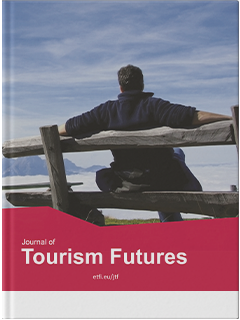The impacts of negative problem orientation on perceived risk and travel intention in the context of COVID-19: a PLS-SEM approach
IF 5.8
Q1 HOSPITALITY, LEISURE, SPORT & TOURISM
引用次数: 2
Abstract
PurposeThe COVID-19 pandemic, which appeared in China in late 2019, has affected the world psychologically, socially and economically in 2020. Tourism is one of the areas where the effects of COVID-19 have been felt most clearly. The study aims to determine the effect of negative problem orientation (NPO) and perceived risk related to the COVID-19 pandemic on travel and destination visit intention.Design/methodology/approachThis study employed a convenience and probabilistic sampling method for collecting data from 531 respondents using an online questionnaire. Partial least square structural equation modeling (PLS-SEM) was used for testing research model.FindingsAccording to the findings, NPO and perceived risk related to the pandemic were found to have direct and indirect effects on the travel behavior of tourists. The results of this research provide theoretical and practical implications for hospitality and travel businesses on topics such as the psychological effects of the pandemic and the travel behaviors of tourists.Originality/valueIt is estimated that the pandemic will also affect tourist behavior due to its effects on human psychology. For this reason, a study conducted in the context of tourist behavior theories is expected to contribute to the literature, managers and future of the tourism.新冠肺炎背景下负面问题导向对感知风险和出行意愿的影响:PLS-SEM方法
2019年底在中国出现的新冠肺炎疫情,在2020年对世界心理、社会和经济产生了影响。旅游业是COVID-19影响最明显的领域之一。本研究旨在确定与COVID-19大流行相关的负面问题导向(NPO)和感知风险对旅行和目的地访问意愿的影响。设计/方法/方法本研究采用便利概率抽样法,通过在线问卷对531名受访者进行数据收集。采用偏最小二乘结构方程模型(PLS-SEM)对研究模型进行检验。根据调查结果,NPO和与大流行相关的感知风险对游客的旅游行为有直接和间接的影响。这项研究的结果为酒店和旅游企业提供了关于流行病的心理影响和游客的旅行行为等主题的理论和实践意义。独创性/价值据估计,由于疫情对人类心理的影响,它还将影响游客的行为。因此,在旅游行为理论的背景下进行的研究有望对文献、管理者和旅游业的未来做出贡献。
本文章由计算机程序翻译,如有差异,请以英文原文为准。
求助全文
约1分钟内获得全文
求助全文
来源期刊

Journal of Tourism Futures
HOSPITALITY, LEISURE, SPORT & TOURISM-
CiteScore
15.70
自引率
6.00%
发文量
64
审稿时长
34 weeks
期刊介绍:
 求助内容:
求助内容: 应助结果提醒方式:
应助结果提醒方式:


